SHARE YOUR DREXEL MEMORIES
Next year, Drexel will mark 125 years since its founding — and a pair of Drexel professors are inviting alumni to help Drexel celebrate by sharing their memories in a book they’re producing about Drexel’s history.
“It’s a big institution and a complicated story,” says Richardson Dilworth, associate professor of history and politics. “It’s gone through so many different reorganizations and so many people have flowed in and out.”
Dilworth and Scott Knowles, an associate professor of history and politics, will unveil their official history book and online oral history next year.
“The history of this place is not just annual reports,” says Knowles. “The history is in the people.”
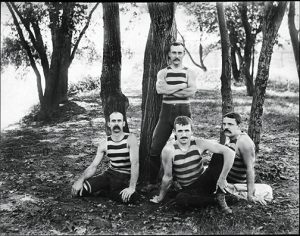
The pair is seeking the help of everyone connected to the University — faculty, staff, students, alumni, neighbors — to tell their stories and provide suggestions for what should be covered in Drexel’s history.
“My expectation is most people have a story to tell, maybe they just haven’t been asked,” Knowles says. “So we’re asking.”
If you’re interested in contributing, email Dilworth at [email protected], Knowles at [email protected] or Carley Roche at [email protected].
CHIMING IN
 The Rittenhouse Orrery Clock is a true darling of The Drexel Collection — and now its 18th-century sounds have been collected in an iPad for anyone to hear at any time.
The Rittenhouse Orrery Clock is a true darling of The Drexel Collection — and now its 18th-century sounds have been collected in an iPad for anyone to hear at any time.
Gifted to the University in 1894 by the widow of Drexel family friend George W. Childs, the clock underwent a total conservation in 2005 and another smaller tweaking completed last year. The piece is beyond worthy of such attention — its technical and orrery dials tell the time (including real time versus sundial time), date, positions of the planets, the rotation of the sun, the phases of the moon and signs of the zodiac. It’s breathtaking, a true masterpiece of engineering and craftsmanship, and the career highpoint for 18th-century astronomer and clockmaker David Rittenhouse. It’s been named “the most important clock in America” (a name bestowed by Drexel alumnus Ron Hoppes BS ’60, a longstanding conservator of the clock, in a book he wrote about the clock in 2009).
Now, attention is shifting to recording and perfecting the clock’s music, which plays on the hour, half-hour and even the quarter-hour. The on-the-hour offerings include 10 tinkly chimes that are now available at the touch of a visitor’s fingertip via a new interactive iPad display. Audio files of each chime ring out; something that you’d have to wait 10 hours to experience previously.
Conservators continue to work on the pitch and scale of the clock’s music-making bells to make them sound more like music rather than the current wind chime-like sound. Once that work is complete, a team of music professionals is standing by to help identify the clock’s 10 songs.
NEW NAME FOR SCHOOL OF PUBLIC HEALTH
Drexel University’s School of Public Health has been named the Dana and David Dornsife School of Public Health in honor of a transformative $45 million gift from longtime philanthropists Dana and David Dornsife.
The couple has donated a total of $58 million to the University over the years, including support for a center for neighborhood partnerships, an office of experiential learning and the Dornsife Global Development Scholars program, which funds students to work on development projects related to water, sanitation and hygiene in Africa.
Dana Dornsife received her bachelor’s degree in business from Drexel in 1983. She is the founder, president and CEO of the Lazarex Cancer Foundation.
David Dornsife, a University of Southern California trustee and 1965 alumnus, is chairman of the Herrick Corp., the largest steel fabricator and contractor on the West Coast.
250 YEARS OF FASHION
This fall, stroll among lush Renaissance textiles and French couture, stunning contemporary couture by Philadelphia native 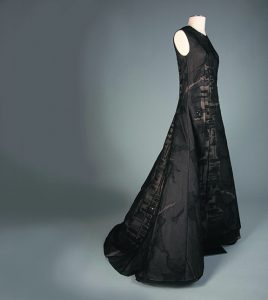 Ralph Rucci (pictured), garments worn by American socialite and style icon Babe Paley and Princess Grace of Monaco, and so much more on a journey through more than 250 years of fashion.
Ralph Rucci (pictured), garments worn by American socialite and style icon Babe Paley and Princess Grace of Monaco, and so much more on a journey through more than 250 years of fashion.
Through Dec. 12 in Drexel’s Leonard Pearlstein Gallery, gorgeous historic fashions from the University’s Robert and Penny Fox Historic Costume Collection are being displayed in the collection’s first large-scale, retrospective exhibition. Immortal Beauty: Highlights from the Robert and Penny Fox Historic Costume Collection, an exhibit funded by support from the Richard C. von Hess Foundation, features more than 75 objects from the museum-quality collection of more than 12,000 garments, accessories and textiles.
The exhibit is free and open to the public.
DREXEL WELCOMES NEW PROVOST
M. Brian Blake took over as the University’s provost and executive vice president for academic affairs in August.
He replaces English and literature scholar Mark L. Greenberg, who will return to teaching after a year sabbatical.
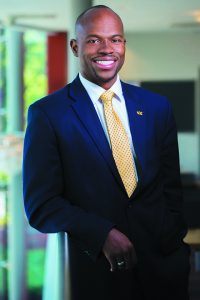
Blake comes to Drexel from the University of Miami in Florida, where he served as vice provost for academic affairs and the dean of the Graduate School. Previous roles include associate dean for research and graduate studies at the University of Notre Dame, and department chair and graduate studies director for computer science at Georgetown University.
Before his career took him to higher education, Blake worked as a software engineer and architect for Lockheed Martin, General Dynamics and The MITRE Co. — all experience that prepared him quite well for a career as an administrator in higher ed, he says.
“My formal training as a software engineer really was about taking a problem that has many different facets and taking a huge group of people with different skills and making them all work together to develop one product,” he says. That “product” in this case is Drexel and its success.
Blake spent the first few months on the job scheduling regular meetings with Drexel’s Faculty Senate and full-day shadowing sessions with each college and school to meet deans, associate deans, faculty and students.
NEW GRADUATE COLLEGE

At Drexel, it’s a good time to be a grad student. The University has completely reenergized its efforts to give graduate students the space, support, opportunities and overall Drexel experience they deserve. The biggest change came in the summer when Drexel announced the establishment of a new Graduate College and introduced then-Interim Provost James Herbert as its founding dean.
The college has a team of core and support staff with four main objectives: continuing and expanding the great work already set in motion by the former Office of Graduate Studies in supporting and advocating for grad students, fostering interdisciplinary research and graduate programs, offering various professional development opportunities to students, and communicating the “Drexel difference” as a way to promote the University’s programs.
In addition, the Graduate College will soon have its very own home: renovated space on the third floor of Main Building that will serve as a place for graduate students to gather and collaborate. Completion is expected in early 2016.
“I couldn’t be more excited about the new college,” Herbert says. “Drexel already has many excellent graduate programs, and this gives us the opportunity to build new programs and strengthen existing ones in ways that will benefit the whole university.”
ENGINEERING COURSES FOR ‘RENAISSANCE PEOPLE’
Drexel has created a new suite of engineering courses intended for non-engineers who want to understand how things work.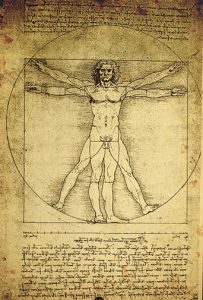
College of Engineering leaders liken the approach to a Renaissance education.
“At the time of the Renaissance, someone like Leonardo Da Vinci could know everything there was to know,” says Bruce Eisenstein, vice dean of the College of Engineering. “He knew arts, he knew science, he knew medicine — he knew everything.”
The new courses are nicknamed “Ex3,” which stands for “Explore, Explain, Experience.” Courses can be taken by any undergraduate regardless of major or school, with no prerequisites.
“If you look at the best lawyers, some of the best physicians, some of the people starting businesses, many of them have started with a technological basis for their education,” Eisenstein adds.
“That’s the way the 21st century works.”
LIBERTY SCHOLARS AT THE FINISH LINE
Each year, 50 young lives get a head start thanks to a unique scholarship program. Drexel’s Liberty Scholars program awards 50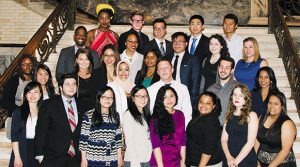 full scholarships annually to Philadelphia high school students who might otherwise have not had the means to attend the University or college at all.
full scholarships annually to Philadelphia high school students who might otherwise have not had the means to attend the University or college at all.
At a celebration honoring 35 of the scholarship holders who graduated in May, Nick Perez, director of the 5-year-old program, says, “This is what it’s all about. It’s fantastic because this is the goal — graduation — and we’re here at the finish line.”
“Liberty Scholars meant everything,” says recent program graduate Zoë Jamison. “All of this wouldn’t have been possible.”
“At Drexel, I was able to reach my potential,” says Linda Vu, an alumna of last year’s inaugural class of scholars who is now a NICU nurse at the Children’s Hospital of Philadelphia. “I didn’t have any bills and I was able to go to class and not have to worry and do my best. That’s how I’m able to be where I am.”
“They’re all successful in whatever major they chose,” says Stephanie Tran, an alumna of the first class of scholars who now works as a tax accountant. “It shows this program works.”


